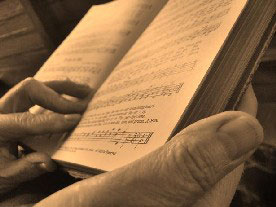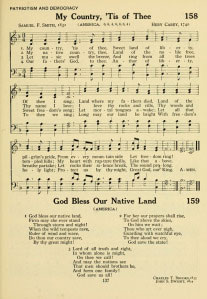

|
| Musical Musings: Hymns and Hymnody |
|
|
Vandals, Leave the Hymns AloneThis article is reprinted from the website, The Catholic Thing, with the permission of the editor.
No difficulty, is there? Say five decades of the Rosary, and you'll employ an old-fashioned grammatical form about two hundred times. No matter. Every child will get the idea that Blessed art thou among women means Blessed are you among women, and Thy will be done means Your will be done. It's not calculus, and, after all, thee, thy, and thine correspond nicely with me, my, and mine. Many a hymn and folk song retain the old pronouns, and we have no trouble with them: "How Great Thou Art," "Nearer, My God, to Thee." And proverbs: "Freedom for me, but not for thee." Our literary heritage: "To thine own self be true." Echoes of Scripture: Thou shalt not kill. Then why do the editors of Catholic hymnals play the blockhead, and mangle good poetry, to get rid of pronouns that we understand and that remain in the Mass and the Rosary anyway? Maybe they are allergic to the sacral — a subject for another day. As far as the hymns go, it's irrelevant. A hymn is a work of art and should be left in its integrity, or, if touched lightly, touched only by artists, not by committees, not by people with a linguistic agenda, and not by blockheads. Let me illustrate the vandalism. I'll take my examples from Worship. Most other Catholic hymnals are worse. Here are the final three stanzas of the Advent hymn, "On Jordan's Bank." We address the Lord directly, asking him to heal us and to raise up the very earth in his light. The doxology brings that direct address to its climax:
For thou art our salvation, Lord, Hard to understand? Not at all. By their not being the usual pronouns, the old forms receive a special stress, as the poet (John Chandler, d. 1876) well knew: thine hand, thy light, thy people. But the editors had to scrawl a moustache on the lady's face. They had to put in you and your, mucking up the sound and muffling the emphasis. And since one of the lines rhymes on thee, they had to botch the whole thing. Here is their final stanza:
All praise the Son eternally, That's a stylistic three-car smashup. The point of view had been second-person address; suddenly it's third-person description.
Somebody should have gotten word to the pop singer Don McLean:
And the three men I admire most, I sure wish some of our music did. Another example from Advent. Here are the first two stanzas of "Come, Thou Long Expected Jesus":
Come, thou long expected Jesus, No trouble, right? Notice the art of each stanza. In the first, we beg Jesus, who was born for this alone, to release us from our fears and sins, so that we may find our rest in him. The poet Charles Wesley — perhaps the greatest hymn writer in English — was surely thinking of the famous words of Saint Augustine: "Our hearts are restless, until they rest in thee."
But the muddlers had to get rid of thou and its forms, and that meant mischief, because when the poet rhymes on one of those, you have to mangle the whole line and sometimes the other rhyming line to boot. Look, listen:
Come, O long expected Jesus, I don't think the editors understood the poem. In any case, free us from captivity adds nothing to the first stanza, and Come, and save us by your birth is in the second stanza only because they needed a rhyme for earth. It spoils the progression and adds nothing to the thought. The grammar of the second is a flop: the subject you, interrupted by two phrases that are now appositions, must await the verb in the fourth line, come, apparently an imperative: "Hey you, come!" I'm not asking for genius. I'm asking for common decency. Vandals, leave the art alone. Article written 09 December 2019
Copyright © 2019 by The Catholic Thing.
All rights reserved. |
Submit Your Music / Contact Us / Company Description / Links
 What three prayers must every Catholic child know?
The Our Father, Hail Mary, and Glory Be.
Those, with the Apostle' Creed, "O my Jesus, forgive us our sins," and the Hail, Holy Queen, are the prayers for the Rosary, which Catholics commonly say.
What three prayers must every Catholic child know?
The Our Father, Hail Mary, and Glory Be.
Those, with the Apostle' Creed, "O my Jesus, forgive us our sins," and the Hail, Holy Queen, are the prayers for the Rosary, which Catholics commonly say.
 All praise the Son — all who, all what?
To what does this third-person pronoun refer?
It can't refer to us, grammatically.
The line is piety salad.
Eternally is there only to rhyme with free.
And why must we say Spirit blest?
Does anybody in English pray to the Spirit-blest?
Or is it that the Spirit is blest forevermore? Then does forevermore not modify adore, as it did in the original?
Is it all so that we don't say Holy Ghost?
All praise the Son — all who, all what?
To what does this third-person pronoun refer?
It can't refer to us, grammatically.
The line is piety salad.
Eternally is there only to rhyme with free.
And why must we say Spirit blest?
Does anybody in English pray to the Spirit-blest?
Or is it that the Spirit is blest forevermore? Then does forevermore not modify adore, as it did in the original?
Is it all so that we don't say Holy Ghost?
 The second stanza is a fine list of names attributed to Jesus, the scenes progressing from Israel to the Gentiles to every individual heart yearning for him.
After the first line, the names always come first, and again we build to a fulfillment: hope, desire, joy.
The second stanza is a fine list of names attributed to Jesus, the scenes progressing from Israel to the Gentiles to every individual heart yearning for him.
After the first line, the names always come first, and again we build to a fulfillment: hope, desire, joy.